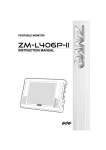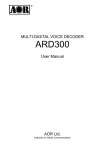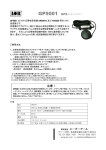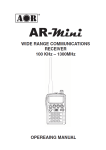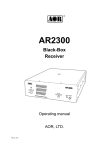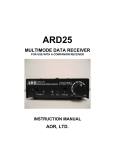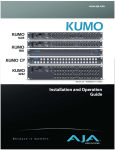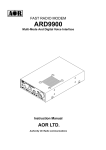Download ARL2300 - Aor Usa
Transcript
American Communication Systems Discover the Power of Communications ™ TO ORDER – VISIT http://www.ameradio.com ® ETHERNET CONTROLLER ARL2300 User Manual AOR Ltd. Authority On Radio Communications Introduction Thank you for purchasing ARL2300. The ARL2300 Ethernet Controller is an option for the AR2300 and AR5001D communication receivers, which allows remote control and remote listening through the network. The client software is based on the Java 2 platform and requires version 1.6 (Java SE 6 runtime) or higher to be installed on the PC on which it is running. The settings of ARL2300 can be easily changed through the local network (DHCP mode) by using a browser, based on Apple’s “Zero configuration” software Bonjour. To obtain the best possible results from your ARL2300, we strongly recommend that you read this manual and familiarize yourself with ARL2300. As for any network related remote control device, a good understanding of LAN,WAN, routers, IP addresses, port forwarding, etc... is necessary to set-up and use ARL2300. Very importantly, you must be able to set-up port forwarding on your own router! Make sure you have access to your router manual before going ahead in setting up ARL2300. As there are hundreds of different router models on the market, with almost as many different ways to configure them, AOR is unable to assist you in troubleshooting port forwarding and network security issues. Every effort has been made to make this manual correct and up to date. Due to continuous developments of the device, we acknowledge that there may be some errors or omission anomalies. 1 Table of contents Introduction ........................................................................................................................................... 1 1 Included in this package................................................................................................................. 3 2 Externals ....................................................................................................................................... 4 3 Typical client / server network ........................................................................................................ 6 4 Connection to AR2300/AR5001D receiver ...................................................................................... 7 5 Front panel power state ................................................................................................................. 9 6 ARL2300 settings ........................................................................................................................ 10 7 ARL2300 client software .............................................................................................................. 18 7.1 How to use the client software.............................................................................................. 18 7.2 Control screen ................................................................................................................... 189 7.3 Terminal command window.................................................................................................. 20 8 Communication procedure ........................................................................................................... 21 8.1 ARL2300 communication protocol ........................................................................................ 21 8.2 TCP receiver control port ..................................................................................................... 21 8.2.1 Special command prefixes ................................................................................................... 22 8.2.2 Firmware version ................................................................................................................. 23 8.3 UDP audio transmission port ................................................................................................ 23 9 Serial port communication specifications ...................................................................................... 25 10 Factory default settings ................................................................................................................ 26 11 ARL2300 specifications................................................................................................................ 27 2 1 Included in this package ARL2300 device 1 Control cable 1 Length 0.9m, straight D-sub 9pin Audio cable 1 Length 1m、φ3.5mm stereo Rubber feet 1 Set of four Printed manual 1 CD-ROM 1 Client software & manual pdf. What you need to prepare: -One straight LAN cable for connection between ARL2300 and your router.(Not supplied) -One available LAN port on your router Note: When used with the AR2300/AR5001D receivers, ARL2300 is receiving power directly from the receiver through the control cable. It does therefore not need to be powered by an AC adapter. Printed manual ARL2300 CD Control cable Rubber feet Audio cable 3 2 Externals ARL2300 front view ARL2300 on top of AR2300 receiver 4 Front panel STA-L Red LED, log-in state STA-A Green LED, operation state Audio IN Audio input 3.5φstereo jack AUX Serial port for future applications Back panel LAN LAN port Receiver Serial connection to receiver DC5V IN DC 5V External power input. (Not needed if connected to AR2300/AR5001D receivers) 5 3 Typical client / server network Case 1: Through a router with NAT. Connect to the external IP address of your router. Setup port forwarding in your router. Router’s external IP. Port forwarding Router with NAT (Network Address Translation) Client software on PC You need to have a GLOBAL IP address assigned to the external port of your router. (Please inquire your internet provider to this effect) Dynamically addressed IP addresses do often change by nature, therefore the client side would have no way to track the IP address changes and would not be able to connect to the remote receiver. It is necessary to setup PORT FORWARDING in your router, towards the IP address of your ARL2300. See chapter 6 “ARL2300 settings” regarding the related port numbers and IP address. Please refer to your router’s manual on how to setup port forwarding. Case 2: Through the Intranet (router without NAT) Connect to IP address of ARL2300. IP address of ARL2300 Router without NAT Client software on PC When you connect to your ARL2300 over the network from the client side software, you must first input the IP address of ARL2300 (or external IP address of your NAT router when using NAT) as a target. You can also input a hostname which shows the IP address registered in the DNS. 6 4 Connection to AR2300/AR5001D receiver ■Receiver serial communication settings If you have changed the receiver’s serial communication settings from the default values, make sure to revert to following: Communication speed 115200bps Interface USB priority, or AUX priority, or AUX only Flow control none ■Setting the receiver’s DIP switches After switching the receiver OFF, use a “minus” driver to put the S2 #2 dip switch into position ON, as described in this graphic >> Warning: Changing dip switch settings while the receiver is ON will cause a receiver malfunction! AR2300: The power switch is on the front panel AR5001D: Use the main power switch on the BACK of the receiver. Dip switch access for AR2300 (bottom of receiver) 7 S1 S2 S3 ■Cable connection The receiver being switched off, connect the cables as follows: ARL2300 front panel ARL2300 rear panel To your ROUTER or HUB LAN cable (not supplied) Control cable Audio cable Receiver rear panel Warning: Connecting / disconnecting the control cable while the receiver is ON will cause a receiver malfunction! Backside of ARL2300 & AR2300 with all cables connected Remarks: On the receiver side, the audio cable can alternatively be connected to the back panel’s LINE output as well as the front panel’s PHONES output. Nevertheless, audio level adjustment is not possible when connected to LINE 8 5 Front panel power state Once all cables are connected as explained in chapter 4 “Connection to AR2300/AR5001D receiver”, you can switch on the receiver. Switching on the receiver will at the same time power the ARL2300. Right after power is on, the red STA-L led will be lit. After approx. 1 minute, ARL 2300 will enter in stand-by mode, the red STA-L led will go off and the green STA-A will be lit. The time necessary to enter the stand-by mode might vary depending on the network environment. ■ARL2300 LED status indicator ARL2300 status STA-L(red LED) STA-A(green LED) Power is off off off Right after powering on, initialize time on off Initializing has ended, stand-by mode off on Connected to client, but no transmission to client on on Connected to client, with transmission to client on flashing Firmware download & installation Combination of both ON and both flashing 9 6 ARL2300 settings Hardware & software requirements to change the ARL2300 settings: Any Windows or Mac PC with a browser having the “Bonjour” add-on installed. See details below. The ARL2300 settings are accessible with a browser using ZEROCONF, a service discovery protocol based on Apple Inc.’s BONJOUR software. The IP address and host name (*1) are assigned automatically, providing your computer has Apple’s BONJOUR (*2) installed, and that your PC is connected to the same LAN than ARL2300. *1: Host name assigned automatically by BONJOUR service discovery. Displayed host name example: http on arlan-0 When more than one ARL2300 devices are connected to the same LAN, the host names are displayed as follows: http on arlan-1, http on arlan-2, http on arlan-3, etc… *2: BONJOUR add-on per browser Safari Bonjour installed by default Mozilla Firefox4 DNSSD for Firefox add-on needed Mozilla Firefox3 BONJOURFOXY add-on needed Microsoft Internet Explorer BONJOUR FOR WINDOWS software needed (Installers on Windows systems normally place Bonjour files in a folder called “Bonjour” within the “Program Files” folder.) ARL2300 has its IP address automatically assigned by the DHCP server; nevertheless you need to manually input the IP address (host name) in the client software. Although the ARL2300 settings page can be accessed at any time, network configuration changes can only be done when ARL2300 is in stand-by mode (only the green LED is on) To open the settings page of ARL2300, type the following address in the browser bar: http://arlan-0.local:48753/ You will then be asked to enter the user name and password (neither can be changed). User name: Admin Password: Arl_2300 After a successful login, the following settings page will appear: 10 ■Address settings: By default, “Obtain an IP address automatically” is selected, nevertheless you can choose to manually enter address parameters to match a particular network environment. ・IP Address(required) IP address you wish to allocate to ARL2300 ・Netmask(required) Netmask for ARL2300 according to the specific network environment 11 ・Gateway Gateway for ARL2300 according to the specific network environment. Leaving it empty is as if you entered the values 0.0.0.0 ・NameServer NameServer for ARL2300 according to the specific network environment. (Required for firmware update) ■Port settings You need to open the following ports on your (NAT) router and to forward these ports to the ARL2300. Receiver remote control will not function unless port forwarding is correctly initiated. Please consult your router documentation on the procedure. Each port number can be set to any value between 10001 and 65535. ・TCP Port Port used to send the control commands to the receiver ・UDP Port Port used for audio from the receiver ・Conf Port Port used to access the ARL2300 settings through the browser ■Timeout Set the range from 10 to 60 seconds, in 5 seconds steps. If the command data from the client software is not received within the time set here, ARL2300will cut the communication with the client. 12 ■Authentication Here you can restrict access from the client software by setting a username and password of your choice.. Leaving blanks would allow anyone to access ARL2300. ■Save options Reload(without SAVE) Reverts all settings to the last saved state. Quit(without SAVE, LOGOUT) Quit the settings page without saving any changes you might have made. Save Settings are saved. At this stage, the changes have not been implemented by ARL2300 yet, as it needs to be rebooted. The next chapter explains this procedure. 13 ■Summary of saved settings & reboot Once your changes have been saved as per the previous chapter, the summary of your ARL2300 configuration will be displayed and you will be given the following choices: Reboot ARL2300 will be rebooted and the changes implemented. Quit without Reboot Logout from the ARL2300 settings without rebooting ARL2300. The settings changes you have previously saved are not implemented yet by ARL2300. Return to Config In case you need to edit the settings again. 14 ■Current client connections Here will be displayed the IP address of the currently connected client. Force disconnect Click this button to force disconnection of the currently connected client. This is the display when no client is connected to ARL2300. Update information Click to refresh the current client connection status (*). (*) While you access the settings page, the “current connection status” is not automatically refreshed. In other words, you would not know if a client accesses ARL2300 while you are on the settings page, unless you click the “Update information” button. ■Firmware update The ARL2300 firmware can be updated online, using ports TCP 80 (HTTP) and 443 (HTTPS). Make sure that your router does allow ARL2300 to access these ports; otherwise the firmware update will fail. Please consult your router documentation on the port access procedure. Please note that the online update might be impossible depending on your firewall and proxy settings. To proceed with the update, click on the “Move to ARL2300 firmware update page” link at the bottom of the ARL2300 settings page. Possibility #1: ARL2300 already has the latest firmware, in which case the following message appears: In this case just click on “Exit ARL2300 Firmware Update” to return to the settings page. 15 Possibility #2: There is a newer firmware version available, in which case the following page appears: Once you are aware of the risks involved and if you wish to go ahead with the update, click on YES The screen will inform you on the update progress as follows: Downloading the kernel… Installing the kernel… 16 Downloading userland image… Installing userland image… End of firmware upgrade, (ARL2300 is automatically rebooting. Disregard any message saying that the Internet connection was interrupted.) 17 7 ARL2300 client software Hardware & software requirements to run the client software: Any PC running Java 2 (v.1.6 or later). See details below. The client software is based on the Java 2 platform and requires version 1.6 (Java SE 6 runtime) or higher to be installed on the PC on which it is running. For more information please refer to http://java.com The supplied ARL2300 client software only supports basic functions of VFO reception, over the network and the internet. The current version does not support the receiver’s advanced features such as search, scan, simultaneous reception etc... 7.1 How to use the client software ◆ Do not execute the client software directly from the CD. You first need to copy the software folder to your client PC. ◆ ARL2300 only allows one client connection at a time. If somebody else is already connected when you try to establish the communication, you will encounter this “Busy!” error message. ◆ Cannot connect to host (ARL2300) message Possible reasons for this error message are: The IP address (or host name) for ARL2300 or its TCP port number you entered in the client software, are incorrect. The IP address, when using dynamic DNS on ARL2300, has not been updates If you can connect to ARL2300 but hear no sound, then most probably the UDP port number is incorrect. ◆ Login incorrect The user name and/or password you entered are incorrect. Entries are case sensitive. 18 7.2 Control screen (see separate A4 size print) 19 7.3 Terminal command window Checking the “Terminal” box at the bottom right of the client software control screen does open the terminal command window. Refer to the AR2300AR5001D receiver manual for the complete command list. To send a command to the remote receiver, type the command in this terminal window and hit the Exec button. Please note that here you can only SEND commands but this window will not show you the response sent by the receiver! This being a “client software” interface, the software will interpret the responses in its interface. Note: As an alternative to the AOR software, you can use a Telnet software to test commands and their responses Example of Telnet command testing 20 8 8.1 Communication procedure ARL2300 communication protocol TCP is used for control data communication between ARL2300 and the client software (client PC). 8.2 TCP receiver control port The receiver control and the ARL2300 control are done with the following TCP control port. TCP communication chart (command names omitted) If the TCP connection procedure has been successful, ARL2300 is sending a “230 Welcome” message to the client PC. Starting from that moment, the receiver is under remote control. If you are using a terminal software, you can now try to send commands such as RX, RF, etc… The command should be terminated by <CR> or <CR><LF>. All responses from receiver are terminating by <CR><LF>. Three digits of result code are added to each message from the ARL2300. If the blank character (blank code) has been added immediately after the result code, the ARL2300 send a simple message and wait for the data from client. 21 If the hyphen (-) has been added immediately after the result code, there is a data or message that needs to be send to client. Do not attempt to send data to the ARL-2300 until the appropriate result code (result code with immediate blank code) is received. Make sure to send data to ARL2300 after the result code with immediate blank code. The result code consists of three digits (in hundreds) and represents the following message groups: 2xx - Immediate success on received command and message. 3xx - Requesting more commands. 4xx - Send message to client and disconnect the link. 5xx - Error The 2xx result code generated from the ARL2300 in the TCP Communication Chart has following meanings: 231 - Prefix for special command, 232 - Adding time stamp to the UDP packet is possible. 233 - Adding LM value (Receiver S-meter value) to the UDP packet is possible. 234 - Maximum octets value for the audio data for one packet. 235 - ARL2300 version information. New result codes may be added at the time of future firmware updates, however, successful TCP connection establishment always ends with the “230 Welcome” message. Refer to chapter 8.3 (UDP audio transmission port) for details on result codes 232, 233 and 234. 8.2.1 Special command prefixes The special CPF (Special Command Prefix) is a header character that controls ARL2300. If data is sent to the ARL2300 without special CPF, the data is applied to the receiver directly. No data is passed on to the receiver if ARL2300 received the command with special CPF, and the data is used to control the unit. Command Command Type Description Audio data length Set the length of audio data for one UDP packet. The length of UDP packet should be set by octet. The octet value should be smaller than Prefix b the result code of 234 and it should be an even number. Example: b2048 ---- Set to octet 2048 e Set special CPF The default character is “@”. To change the special CPF, use this command. Example: e+ 22 ---- Set special CPF to “+” f Select LPF Selects the LPF in the ARL2300. The cut-off frequency and parameter as follows: f0: Through, f1: 9kHz, f2: 6.4kHz, f3: 3.2kHz g Select gain Selects the audio gain of the ARL2300. The audio gain and parameter as follows: g0: 0dB, g1: +3dB, g2: +6dB, g3: -6dB l p q Add LM to UDP Adds the LM value (S meter value) to UDP data. packet Example: l0: No LM vale is added , l1: LM value is added Start audio This command is required to start audio transmission from the transmission ARL2300. Please see details in chapter 8.3. End audio Stop audio transmission from the ARL2300. transmission s Select audio Selects the sampling rate (audio quality). This command sampling rate should be used with the “f” command. Available sampling rates and parameters as follows: s8000: 8kHz, s11025: 11.025kHz, s16000: 16kHz, s22050: 22.05kHz, s32000: 32kHz, s44100: 44.1kHz, s48000: 48kHz t Add TIME STAMP Adds the time-stamp to UDP packet. The time-stamp format to UDP packet is a value in seconds started from Jan 1, 1970. (aka Unix time) Example: t0: No time stamp is added. t1: Time stamp is added. 8.2.2 Firmware version The number followed by the result code 235 is a version number of the ARL2300. The number only represents major change in the firmware. 8.3 UDP audio transmission port To receive UDP data (audio data) from remote ARL2300, the client PC needs to send the “p” command as described in chapter 7.2.1. UDP Payload Diagram 23 Furthermore, UDP requires audio transmission start command immediately after the “p” command. The UDP command is @p1. This command should be sent to the ARL2300 every 10 to 120 seconds until audio transmission is stopped. To temporarily stop the UDP data transmission from the ARL2300, the q1 command should be issued. To stop the UDP data transmission completely, the q command should be issued. The q1 command can be altered by q if complete termination of UDP transmission is needed. ■ AUDIO DATA Audio data is an uncompressed PCM with symbol consisting of 16-bit little-endian format. One payload can carry 800 octets as initial value. The size can be changed by “b” command as described in chapter 8.2.1 “Special command prefixes”. However, maximum octet value should be smaller than the result code of 234 and it should be an even number. The maxim audio data size shown in the TCP Communication Chart is 2048, that is a part of result code 234 (234-AUBFSZIE2048) shown in the example. ■ SEQUENCE NUMBER Every single octet data send over UDP has a sequence number between 0 and 255. The sequence number increases in every UDP packet transmission. ■ TIME-STAMP The time-stamp format is a value in seconds started from Jan 1, 1970. (aka UNIX time) and it represents the latest incidence of the generated data. The time-stamp is 4 octets in size and stored in big-endian format. The inclusion of TIME-STAMP can be selected by the “ t“ command as described in chapter 8.2.1 “Special command prefixes”. The default value is t0 (No TIME-STAMP is added). ■ LM VALUE The LM value space of the UDP payload stores the leading 9 characters string of the actual LM value. If the associated receiver responds with the LM command, the receiver sends the LM value. The inclusion of LM can be selected by the “ l “ command as described in chapter 8.2.1 “Special command prefixes”. The default value is l0 (No LM value is added). 24 9 Serial port communication specifications 1. Receiver (back panel) Communication speed 115200bps (non-changeable) Data 8bit Stop bit 1 Flow control none Pin layout DTE 2. AUX (front panel) (for future applications) Communication speed 9600bps (non-changeable) Data 8bit Stop bit 1 Flow control none Pin layout DTE 25 10 Factory default settings ■ARL2300 defaults Item Default Remarks TCP Port 48752 Used for receiver control UDP Port 48752 Used for voice transmission Conf Port(TCP) 48753 Used to access the configuration screen User arl2300x Login name to access ARL2300 Password Arl_2300Q Password to access ARL2300 Configuration User Admin Configuration Password Arl_2300 AUX (for future applications) 48751 Login name to access configuration. Cannot be changed. Password to access configuration. Cannot be changed. Number set automatically as TCP number -1. Cannot be changed manually. 26 11 ARL2300 specifications Item number ARL2300 Function Ethernet controller for AR2300/AR5001D receivers LAN socket Receiver socket Audio IN socket RJ-45 type 10BASE-T / 100BASE-TX10/100Mbps (auto-sense) D-sub 9pin type Connection to AR2300/AR5001D receiver 3.5mm stereo used as mono Connection to AR2300/AR5001D audio output AUX socket D-sub 9pin type, RS-232C (For future applications) Network protocols TCP (receiver control), UDP (voice transmission) Required network speed Constant 80, 160, 500kbps depending on sampling rate choice. Controller Cirrus Logic EP9307 CPU core ARM920T (200MHz) Operating system Linux (Kernel 2.6.x) Power requirements DC5V by external power source. When connected to AR2300/AR5001D receiver, power is supplied by receiver. Power consumption 1.8W (typical) Current consumption Max. 300mA Operating temperature 0 〜 50 °C Dimensions (H)35mm x (W)130mm x (D)150mm (projections excluded) Weight 400g (without cables) Control cable(D-sub 9pin, straight) x1 Supplied accessories Audio cable(φ3.5mm stereo) x1 Rubber feet x4 Hardware & software requirements for Any Windows or Mac PC with a browser having Apple’s “Bonjour” add-on installed. ARL2300 settings Hardware & software requirements for client Any PC running Java 2 (v.1.6 or later). 27 ® AOR Ltd. 2-6-4 Misuji, Taito-ku, 111-0055 Tokyo, Authority On Radio Communications Japan www.aorja.com (v01 20110803)



































